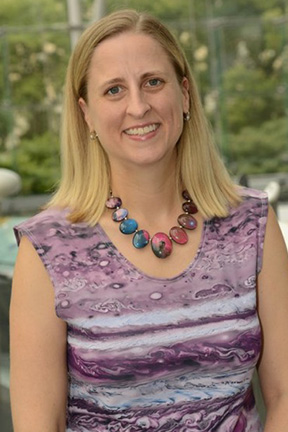Candidate Statement: Emily Rice
Nominated Office: Nominating Committee
Affiliation: CUNY College of Staten Island & American Museum of Natural History
Position/title: Associate Professor
PhD institution: UCLA (2009)
Areas of scientific interest:
- Low mass stars, brown dwarfs, and exoplanets; specifically infrared spectroscopy, high-contrast imaging, and model atmospheres
- Mentoring students, especially those from groups & backgrounds underrepresented in science careers
- Creative science outreach & communicating with the public; specific projects include Astronomy on Tap events and the STARtorialist science-fashion blog
AAS positions & dates:
- AAS Presidential Early Career Advisory Board (2016)
Other relevant positions and experience:
- Member/chair of the Research Committee of the Faculty Senate, CUNY College of Staten Island (2012 – 2018)
- Reviewer for NSF, NASA, Sloan Foundation, SACNAS, AAS journals & small research grants, CAPJournal (2010 – present)
- Women's Center Advisory Board, CUNY College of Staten Island (2017 – present)
Candidate statement:
As a member of the AAS Nominating Committee I will work to ensure that the Officers and Trustees of the AAS reflect as completely as possible both the current and optimal future membership of the AAS. Now that I am tenured faculty with an established and productive research group (see http://www.bdnyc.org/ for more details), I am eager to increase my involvement in the AAS. I believe that our professional organization has a tremendous amount of potential to transform our scientific community to be accessible, inclusive, equitable, and even to set an example for other scientific disciplines. This impetus for change, though it may begin among the members, needs to be enthusiastically supported by the Officers and Trustees of the AAS in order for it to be effective and long-lasting. My initial focus on the Nominating Committee is to ensure that our Officers and Trustees prioritize our members who stand to benefit the most from these changes, including students, people from groups and/or backgrounds underrepresented in science careers, academic astronomers who are isolated in their departments and/or institutions, and astronomers who have pursued careers outside of astronomical research. Recognizing that service work can place disproportionate burden on people who are part of marginalized groups, I will ensure that the Officers and Trustees also include people in privileged positions who are informed and effective advocates. I firmly believe that the inclusion and support of astronomers in the broadest definition possible will improve the professional experience for everyone involved.


